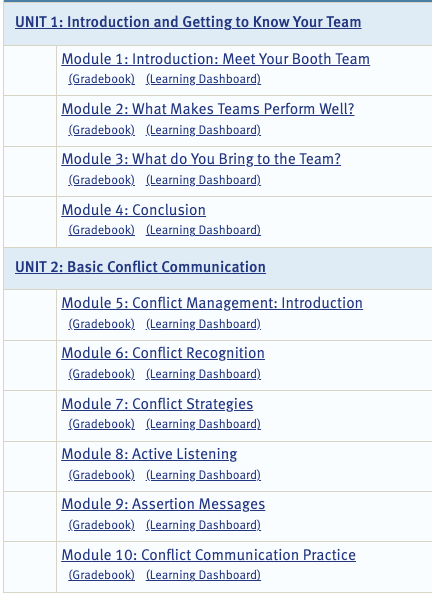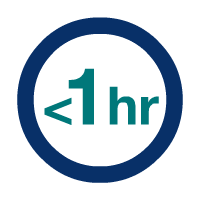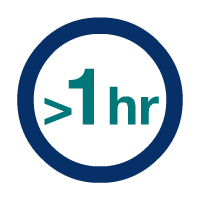CollaborativeU

What is it and how does it work?
Online modules designed to teach team collaboration skills. Students work through two online modules independently – learning collaboration skills and practicing them with virtual teammates – and then receive instructions to (optionally) complete application activities with their real teammates.
Which skill(s) are targeted?
This rubric can be used to measure mastery of the following collaboration competencies:
- Participate in constructive dialogue to support both the process and product of the collaboration
- Shape teams and navigate collaborations in consideration of individual differences and interpersonal dynamics
- Apply skills and processes to resolve and manage disagreements in collaborative settings
NOTE: These modules are also designed to promote students’ positive attitudes toward teamwork and to highlight the benefits of honing one’s collaboration skills.
Who else has used it?
As of 2021, the CollaborativeU modules have been used at CMU by over 4,000 students and 150 courses across all seven schools and colleges. For example, it has been used in the introductory MCS core education course for first-year students, in Design electives for upper-class undergraduates, and with Heinz Master’s students working in teams.
Colleagues at CMU conducted a randomized, controlled trial to test the efficacy of CollaborativeU in the context of the introductory MCS course (Gadgil et al., 2018). Students (N=226) received either CollaborativeU or an equivalent (in time and format) “control” module focused on skills other than collaboration. Results showed that students who completed CollaborativeU had significantly better outcomes in their team process and product, relative to control students. Moreover, CollaborativeU students maintained more positive attitudes about teamwork and self-assessments of their skills when surveyed nearly a year later.
 Educator time commitment
Educator time commitment
The educator time commitment for incorporating CollaborativeU is less than an hour overall. This includes requesting access to the online modules, adding a few instructions to your syllabus/assignments, and, if applicable, incorporating completion data into students' final grade. There is a supplemental, instructor-focused module that provides more information on how to incorporate this resource into a project-based course, including how to implement the pre-post-tests and use the handouts and classroom exercises.
 Student time commitment
Student time commitment
Each of the two modules in CollaborativeU takes students about 45 minutes to complete individually, and the optional in-team activities take about 15-20 minutes. Many educators include this as part of an assignment early in a project (i.e., after teams are formed but before they engage in significant work together). NOTE: If used in a course context, this time should be factored into students' coursework time.
Contact eberly-assist@andrew.cmu.edu for help with incorporating this resource.
Educator how-to steps
-
Email eberly-assist@andrew.cmu.edu to request that CollaborativeU be added to your Canvas site (or be set up separately if you are not using Canvas). Please include the following information in your request: Course number/name or Canvas site name, whether you would like students to complete the pre/post-test regarding their collaboration skills and attitudes, and any other questions you have about using these modules.
-
Optional: Review the instructor-focused module on how to incorporate CollaborativeU into your program/course design.
-
Decide when students should complete the CollaborativeU modules and then include this in the corresponding assignments/instructions to students.
See these related resources…
ConflictU
OLI course designed to develop skills and strategies for managing conflicts that arise in teams.
MeetingU
OLI course designed to develop skills and strategies for managing, participating in productive meetings.
Reference
Gadgil, S., Braun, M., Harty, M., Hovis, K., & Lovett, M. (2018). Investigating the impact of an online collaboration course on students’ attitudes and learning. In Kay, J. and Luckin, R. (Eds.). Rethinking learning in the digital age: Making the learning sciences count, 13th International Conference of the Learning Sciences (ICLS) Volume 1 (pp. 536-543). London, UK: International Society of the Learning Sciences.